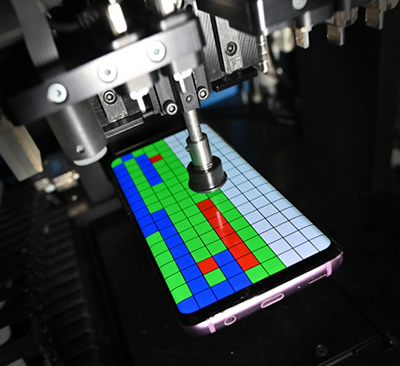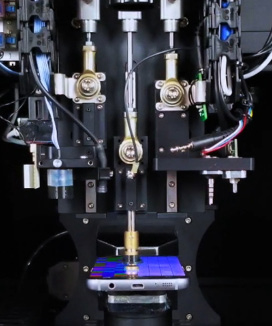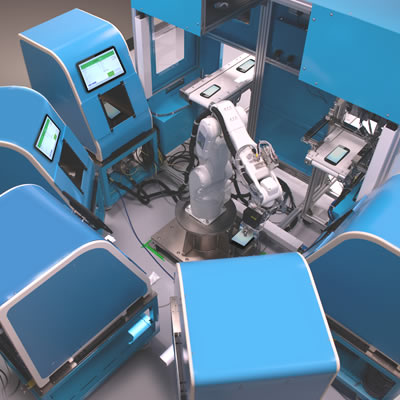On a bustling street in Tokyo, a commuter swaps out last year's smartphone for the newest model, slipping the old device into a drawer—out of sight, out of mind. Multiply this scenario by billions, and the scale of electronic waste becomes staggering. Approximately 1.5 billion smartphones are discarded globally each year, contributing to a mounting environmental crisis. Yet, within this challenge lies a significant opportunity: transforming how we handle these devices through “precision triage." A new approach known as precision triage is redefining reverse logistics by enhancing operational efficiency, boosting profitability, and promoting sustainability in the mobile device industry.
The Mobile Device Waste Dilemma and the Renewal Opportunity
The rapid pace of technological advancement has shortened the lifecycle of mobile devices. Consumers, driven by the allure of the latest features and upgrades, are replacing their smartphones at a frequent rate. This trend has led to an exponential increase in discarded devices, many of which end up in landfills, exacerbating environmental concerns.
Conversely, there's a growing market for refurbished devices fueled by affordability concerns, the expansion of emerging markets, and a heightened awareness of environmental issues. This shift presents a lucrative opportunity to reclaim value from discarded smartphones, transforming potential waste into profitable assets.
Precision Triage: A Game-Changer in Device Renewal
Precision triage represents a significant leap forward in the reverse logistics of mobile devices. It utilizes advanced diagnostics and streamlines intake processes to efficiently assess and route devices through the renewal pipeline. Traditional evaluation methods are no longer sufficient for today's complex electronics; precision triage offers a sophisticated solution to meet this challenge.
The process typically involves:
- Rapid Initial Assessment: Quickly determining the cosmetic and functional condition of the device.
- Automated Diagnostics: Employing technology to identify issues without manual intervention.
- Efficient Routing: Directing devices to the appropriate next steps—resale, repair, or recycling— based on their assessed value and condition.
By implementing this systematic approach, each device is channeled to its optimal path, maximizing value recovery, and minimizing unnecessary handling.

Advantages of Precision Triage for Reverse Logistics
Revenue Optimization Through Intelligent Routing
One of the primary advantages of precision triage for reverse logistics is its ability to enhance revenue by ensuring devices are routed for maximum profitability, thereby enabling resellers to extract value from used, returned, or damaged devices. Accurate and swift assessments enable companies to make informed decisions, aligning each device with the most lucrative disposition.
"Automation in the triage process has dramatically improved our customers' ability to make quick, accurate decisions about device disposition," says Brad Treese, VP of Marketing and Business Development at FutureDial, a leading provider of precision triage solutions. "This translates directly to improved profitability and operational efficiency."
Precision triage allows businesses to unlock hidden value in returned devices, turning what was once considered waste into a significant revenue stream.
Cost Reduction and Process Efficiency
Precision triage also significantly reduces costs by minimizing manual touches, avoiding unnecessary repairs, and automating the assessment process. Industry data indicates that implementing precision triage systems can boost diagnostic accuracy by 25 to 30%, leading to substantial cost savings and increased throughput. Streamlined operations enable companies to handle larger volumes without a proportional increase in labor costs.
Scalability: A Competitive Edge
A compelling feature of precision triage systems is their scalability. Designed to manage volumes ranging from thousands to millions of devices, these systems maintain efficiency and profitability regardless of scale. This scalability offers businesses the ability to adapt to market fluctuations without significant additional resources.
For example, leading industry solutions have developed automated mobile device intake processes that enhance exception handling and enable intelligent routing. By minimizing manual labor and maximizing throughput, these systems allow businesses to expand their operations seamlessly, meeting growing demand without compromising efficiency.
Scalability is crucial in today's market and precision triage systems provide flexibility to grow and adapt quickly, which is a significant competitive advantage.
Environmental Sustainability Through Precision Triage
The environmental impact of precision triage is profound. By extending the lifespan of mobile devices and ensuring each unit is utilized to its fullest potential, these systems play a crucial role in mitigating electronic waste.
Studies from UC San Diego reveal that up to 85% of a smartphone's carbon footprint stems from its production phase1. By promoting the reuse and refurbishment of devices, precision triage significantly reduces the demand for new device manufacturing, thereby lowering the industry's overall carbon footprint.
Moreover, the focus on eliminating unnecessary repairs and optimizing device value aligns with global sustainability goals. Companies adopting precision triage often find their profitability objectives harmoniously intersect with environmental stewardship, offering a compelling proposition in an increasingly eco-conscious market.
Environmental responsibility and business efficiency are not mutually exclusive, and precision triage shows how companies can achieve both.

Integrating Precision Triage into the Reverse Logistics Ecosystem
Precision triage is an integral component of the broader reverse logistics ecosystem, encompassing the complete lifecycle of device return, refurbishment, and resale. Key stages in this ecosystem include:
- Device Collection: Gathering used or discarded devices from consumers and businesses.
- Dispositioning: Assessing and triaging devices to determine their next steps.
- Repair and Refurbishment: Restoring devices to sellable condition.
- Repackaging: Preparing devices for resale with appropriate packaging and documentation.
- Reselling: Marketing and selling refurbished devices to consumers.
- Recycling and Reuse: Safely disposing of or repurposing devices that cannot be refurbished.
- Information Management: Automating workflow decisions based on business rules that provide real-time data management.
Advanced solutions in the industry are pivotal during the dispositioning, repair, and repackaging stages. By automating and optimizing these processes, such systems enhance accuracy, reduce manual labor, and significantly improve the efficiency of the reverse logistics cycle.
These advancements not only boost operational performance but also support the circular economy model. By facilitating the efficient reuse and refurbishment of mobile devices, precision triage helps maintain a sustainable inventory of reusable devices, reduces waste, and contributes meaningfully to environmental sustainability.
Case Study: Dis-Connect Transforms Operations with FutureDial's Precision Triage System
Dis-Connect, a key player in the European refurbished electronics market, has leveraged the transformative power of precision triage through its strategic partnership with FutureDial. By integrating FutureDial's automated device processing solutions, Dis-Connect has streamlined its operational efficiency and expanded its processing capacity to meet growing market demands.
Enhancing Capacity and Efficiency
At Dis-Connect's state-of-the-art facility in Karlsruhe, Germany, the implementation of automated testing and advanced grading technologies from FutureDial marks a significant upgrade in their device processing capabilities. These machines are engineered to handle over 500 smartphones each per day per shift, enabling Dis-Connect to manage large volumes with unprecedented speed and accuracy.

Streamlined Precision Triage Process
The precision triage workflow at Dis-Connect is designed to ensure each device is processed optimally.
This includes:
- Initial Inspection and Data Security: Devices enter the SMART Receiving station, where they undergo initial checks, including comprehensive data wiping and verification for security locks, ensuring all personal information is securely erased.
- Automated Testing with SMART Test: Each smartphone is equipped with FutureDial's test application and placed into the SMART Test machine. This advanced system conducts over 90 tailored tests specific to each device's make and model, thoroughly assessing functionality and performance.
- AI-Powered Grading: Post-testing, devices are evaluated using FutureDial's AI-driven grading machine. Dis-Connect has enhanced this system with its proprietary AI-based grading software, ensuring precise classification based on condition and value.
- Final Data Wipe and Preparation for Resale: Before reaching the market, each device undergoes a final data wipe, guaranteeing data integrity and preparing the smartphones for resale as certified pre-owned devices.
Integrated Information Management with Decision Manager
Dis-Connect's precision triage system utilizes FutureDial's Decision Manager, a cloud-based software solution that coordinates the overall process. This system automates workflow decisions based on predefined business rules, applying device-specific processing steps according to each unit's condition. Decision Manager integrates with existing infrastructure and other FutureDial solutions, centralizing data management and decision-making across all stages of device processing.
Dis-Connect can also configure and update business rules without extensive coding while adapting to operational changes as needed. By automating this workflow, Decision Manager helps reduce manual errors and standardize processing across the facility. This integration of information management throughout the triage process contributes to Dis-Connect's ability to handle large volumes of devices efficiently.
Achieving Results
This implementation has empowered Dis-Connect to consistently deliver high-quality, certified preowned smartphones to major clients, including leasing company Grover and German telecom operator Freenet. The efficiency and reliability of the precision triage system have enabled Dis-Connect to scale operations without compromising on quality or turnaround times.
"FutureDial’s solution is extremely versatile and fits perfectly into our processing workflow. Two of our major customers wanted consistency in grading and optimization in our processing, and with the support of FutureDial, we’ve been able to meet these demands." says Georg Dis, CEO of Dis-Connect.
Driving Sustainability and Profitability
By adopting FutureDial's precision triage technology, Dis-Connect has not only maximized operational efficiency and profitability but also reinforced its commitment to sustainability. The ability to accurately assess and grade devices ensures that each smartphone is either refurbished for reuse or responsibly recycled, significantly reducing electronic waste and supporting environmental stewardship.
The Future of Precision Triage in Reverse Logistics
Looking ahead, the potential for innovation in precision triage is vast. Emerging technologies like machine learning and the Internet of Things (IoT) promise to elevate triage accuracy and efficiency to new heights. Predictive analytics could enable even smarter routing decisions, further reducing touchpoints and streamlining the renewal process.
For businesses in the reverse logistics sector, staying at the forefront of these technological advancements is essential. Embracing innovation in precision triage systems not only maintains competitive advantages but also sets new industry benchmarks.
Conclusion
Precision triage represents a transformative leap forward in reverse logistics for mobile devices. By optimizing profitability, enhancing operational efficiency, enabling scalable growth, and promoting environmental sustainability, these systems are redefining industry standards.
As the mobile device market continues to expand and evolve, the significance of effective reverse logistics solutions will intensify. Companies that integrate advanced precision triage systems position themselves as industry leaders, achieving operational success while exemplifying sustainable business practices.
The revolution in reverse logistics driven by precision triage is more than an operational enhancement; it's a pivotal step toward reducing electronic waste and fostering a sustainable future for the mobile device industry. The continued development and adoption of these innovative solutions are essential to addressing the intertwined challenges of economic viability and environmental responsibility in mobile device renewals.
Brad Treese is a seasoned executive with experience in sales, marketing, and business development. As Vice President of Marketing & Business Development at FutureDial, Brad focuses on driving revenue growth and fostering strategic partnerships. He also leads a consulting practice that advises technology companies on go-to-market strategies, leveraging his deep industry insights. Brad's career spans leadership roles at T-Mobile USA and several technology firms across both the telecom and tech sectors.